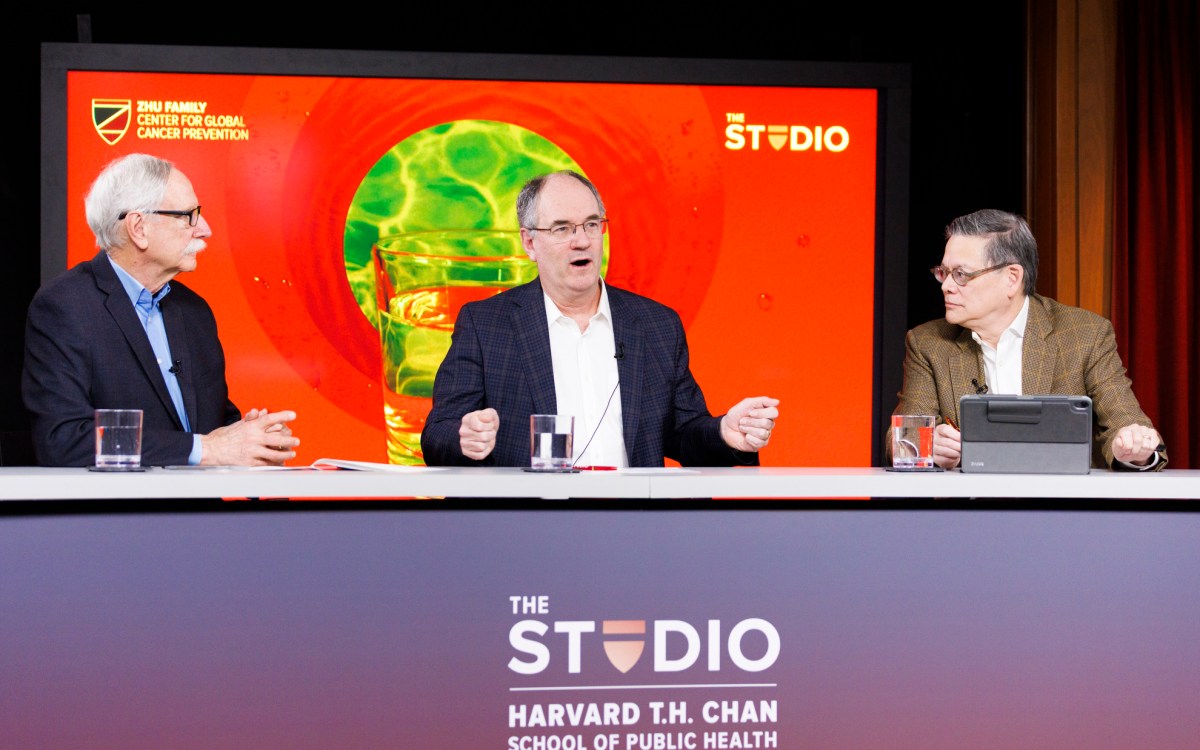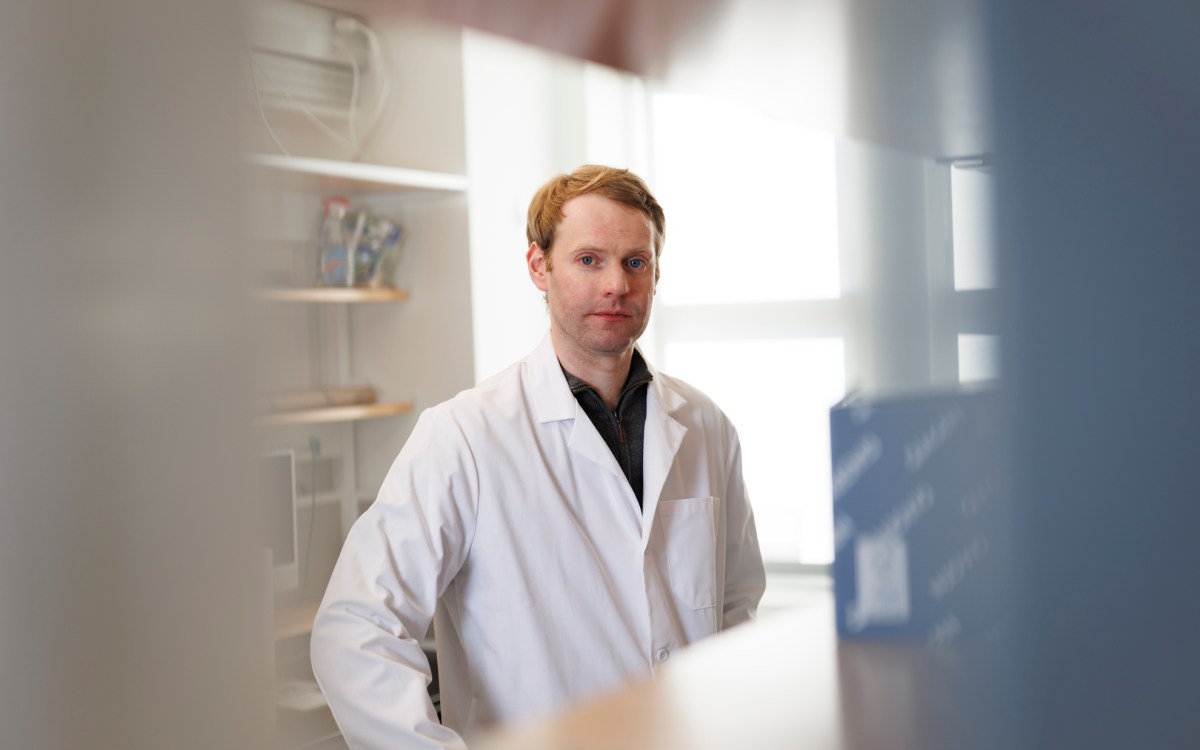Health
-

Which is worse, a soda or a beer?
Experts seek to clarify the health effects of alcohol and sugary drinks
-

‘I think I know how to fix this.’
How a discovery in a Harvard lab is offering hope for patients with hard-to-treat heart disease

-

American heart health worsening
New statistical snapshot finds disappointing trend despite advances in treatment, ways to prevent nation’s leading cause of death

-

Tracking mysteries of loss of Y chromosome, cancer
Research suggests it may explain higher incidence, severity of some disease in men
-

How realistic is ‘The Pitt’?
Doctors weigh in on what hit TV show gets right and wrong about life in the ER — from pacing and caseloads to workplace culture (and that waiting room from hell)
-

Yoga can help cut severe, initial opioid-withdrawal period in half, study finds
Researchers say results could dramatically increase chances of recovery
-
Nanowire arrays can detect signals along individual neurons
Opening a whole new interface between nanotechnology and neuroscience, scientists at Harvard University have used slender silicon nanowires to detect, stimulate, and inhibit nerve signals along the axons and dendrites of live mammalian neurons.
-
Mental casualties of Vietnam War persist
More than 30 years after the end of the war in Vietnam, the effect of lingering stress on Americans who fought there continues to cause stress among researchers.
-
Heat waves deadliest for blacks, diabetics
Heat waves, like the one that scorched the country in July, are more deadly for some people than for others. Poor blacks and diabetics fare the worst. As you might guess, extreme heat is also hard on the elderly. But as you might not guess, extreme cold has a greater impact.
-
Beetles’ past tells volumes about tropical evolution
Experts seeking to explain the amazing diversity of the tropical rain forest have typically done so in two ways, viewing forests as either “evolutionary cradles” that encourage the rapid development…
-
Molecule predicts type 2 diabetes
A study in the June 15, 2006, issue of The New England Journal of Medicine reveals that elevated levels of a molecule called RBP4 (retinol binding protein 4) can foretell…
-
Discovery could aid fight against cystic fibrosis infection
Harvard Medical School researchers have discovered one way that a hardy disease-causing bacteria could be surviving in the lungs of chronically infected cystic fibrosis patients. “This work is important because…
-
Harvard Stem Cell Institute researchers granted approval
After more than two years of intensive ethical and scientific review, Harvard Stem Cell Institute (HSCI) researchers at Harvard and Children’s Hospital Boston have been cleared to begin experiments using…
-
Nicotine vaccine to be tested at Massachusetts General Hospital
A novel approach to helping smokers kick the habit – a vaccine – will be tested at Massachusetts General Hospital (MGH). The nicotine vaccine NicVax is designed to keep nicotine…
-
Harvard Medical School signs agreement with Merck to develop potential therapy for macular degeneration
Harvard Medical School announced May 23, 2006 that is has signed a multimillion-dollar license agreement with Merck & Co. Inc. to develop potential therapies for macular degeneration, an eye disease…
-
New data finds defibrillator recalls to be common
Data presented May 19, 2006 at the Heart Rhythm Society’s 27th Annual Scientific Sessions finds that during a 10-year study period more than one in five automatic external defibrillators (AEDs)…
-
Schepens scientists first to discover angiogenesis switch inside blood vessel cells
Scientists at Schepens Eye Research Institute, an affiliate of Harvard Medical School, are the first to discover a switch inside blood vessel cells that controls angiogenesis (new blood vessel growth).…
-
Study offers new hope for preventive vaccine for AIDS
New research by Dana-Farber Cancer Institute scientists suggests that it may one day be possible to immunize healthy individuals against HIV-1, the virus that causes AIDS. In a study published…
-
Medical School researchers isolate nerve growth compound
Researchers at Harvard Medical School and Children’s Hospital Boston have isolated a molecule that stimulates the regrowth of damaged adult nerve fibers, providing new hope for those suffering from nerve…
-
Study shows different insulin signaling components control glucose and lipid metabolism in the liver
Insulin uses two distinct mechanisms to control glucose and the metabolism of blood fats (lipids) in the liver, a new Joslin Diabetes Center-led study has discovered. Failures in each of…
-
New combination of treatments is effective for alcohol dependence
McLean Hospital researchers, along with colleagues from 11 other study sites nationwide, report that the medication naltrexone and up to 20 sessions of alcohol counseling delivered by a behavioral specialist…
-
Potential Alzheimer’s vaccine improves learning and memory deficits in mice
Researchers have found that a vaccine for Alzheimer’s disease improves learning and memory deficits in mice. “Our findings show promise for a potentially safer and more effective Alzheimer’s vaccine in…
-
Melatonin most effective for sleep when taken for off-hour sleeping
Researchers from the Divisions of Sleep Medicine at Brigham and Women’s Hospital and Harvard Medical School have found in a double-blind placebo-controlled clinical study that melatonin, taken orally during non-typical…
-
Researchers learn more about ways to regenerate the ear’s hearing cells
Massachusetts General Hospital researchers have made important progress in their ongoing effort to regenerate the inner ear’s hair cells, which convert sound vibrations to nerve impulses. In the Proceedings of…
-
Bone-marrow-derived stem cells can reverse genetic kidney disease
The discovery that bone-marrow derived stem cells can regenerate damaged renal cells in an animal model of Alport syndrome provides a potential new strategy for managing this inherited kidney disease…
-
Attention shoppers: Researchers find neurons that encode the value of different goods
Researchers at Harvard Medical School report in the April 23, 2006 issue of Nature that they have identified neurons that encode the values that subjects assign to different items. The…
-
Proteasome recognized as nuclear player on gene-transcription team
One of the most common agents in the cytoplasm of the cell, the proteasome, also plays a widespread and critical role in transcription from inside the cell nucleus. Pam Silver,…
-
Sense of security may be false with tried and true anti-inflammatories
For all the tender joints and headaches they relieve and colon cancer they may prevent, the older nonsteroidal anti- inflammatory drugs (NSAIDs) raise another serious health risk. The highly publicized…
-
Advances in chemotherapy improve outcomes in select breast cancers
Recent advances in chemotherapy have significantly reduced the risk of disease recurrence and death in breast cancer patients whose tumors are not hormone sensitive, according to a study by researchers…
-
Scientists discover new genetic subtypes of common blood cancer
Scientists at Dana-Farber Cancer Institute and collaborators have identified four distinct genetic subtypes of multiple myeloma, a deadly blood cancer, that have different prognoses and might be treated most effectively…
-
Gene chips aid drug search in rare cancers
When Kimberly Stegmaier was a pediatric oncology fellow at Dana-Farber and Children’s Hospital Boston six years ago, she says,”I was struck by how poorly our young patients with AML (acute…
-
Seven children doing well with laboratory-grown organs
Three boys and four girls treated at Children’s Hospital Boston are the first people in the world to receive laboratory-grown organs. The children, aged 4 to 19, received bladders grown…
-
Prayers don’t help heart surgery patients
Many – if not most people – believe that prayer will help you through a medical crisis such as heart bypass surgery. If a large group of people outside yourself,…
-
X inactivation seen as contact sport
At an early stage in a female embryo’s development, one of the two X chromosomes in each of its cells becomes inactivated. In two recent papers, the lab of Jeannie…
-
Dominican insects, digitized
It’s the brilliant colors and otherworldly shapes of the Dominican insects that catch the eye and draw a viewer in. It’s the alien forms magnified for all to see clearly…
-
Getting ACL tears to heal themselves
Orthopedic surgeon Martha Murray reports that a collagen gel enriched with blood platelets can stimulate natural healing of a partial anterior cruciate ligament (ACL) tear. Murray and colleagues at Harvard-affiliated…

